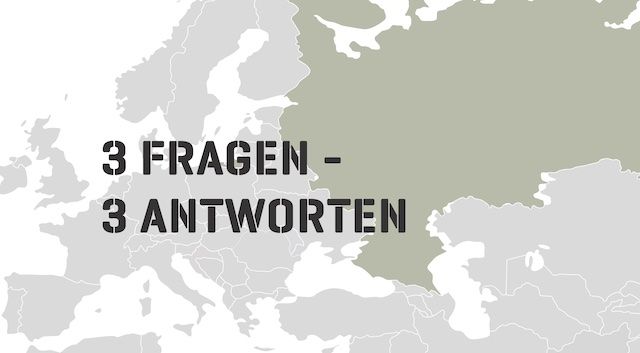Hol Dir den wöchentlichen SPARTANAT-Newsletter.
Dein Bonus: das gratis E-Book von SPARTANAT.

UKRAINE: 3 FRAGEN – 3 ANTWORTEN, TEIL 30: 9. Mai?
Am 9. Mai, dem russischen "Tag des Sieges", feiert Russland den Sieg über Nazi-Deutschland.
In Zusammenhang mit dem Ukraine-Krieg vermuten viele Experten, dass dem 9. Mai eine besondere Bedeutung zukommen könnte. Was es mit diesem Datum auf sich hat, erklärt Oberleutnant Christoph Bilban. Er ist Forscher am Institut für Friedenssicherung und Konfliktmanagement der Landesverteidigungsakademie in Wien. Seine Forschungsschwerpunkte umfassen unter anderem die Konflikte im postsowjetischen Raum und die Außen- und Sicherheitspolitik der Russischen Föderation.

Das sagt der Bundesheer Experte:
Warum hat der 9. Mai für Russland eine dermaßen große Bedeutung?
Russland feiert am 9. Mai den „Tag des Sieges“ über Nazi-Deutschland im Jahr 1945. Die für die damalige Sowjetunion verbindliche Kapitulationserklärung wurde nämlich erst kurz nach Mitternacht am 9. Mai 1945 – aber rückwirkend mit 8. Mai 1945, 23:01 Uhr – in Berlin unterzeichnet. Die Zeitverschiebung zwischen Berlin und Moskau führte aber sowieso dazu, dass aus russischer Sicht der Krieg am 9. Mai endete. Im Juni 1945 wurde der Sieg mit einer stundenlangen Militärparade am Roten Platz in Moskau gefeiert.
In den folgenden Jahrzehnten war der „Tag des Sieges“ in der Sowjetunion nur ein Gedenktag an die Opfer des Krieges; zum offiziellen Staatsfeiertag wurde er erst 1965. Auch Paraden fanden nur zu großen Jubiläen (z.B. 1965, 1985) statt, da für die Kommunistische Partei die Parade zum Jahrestag der Oktoberrevolution bedeutsamer war.
Im unabhängigen Russland gab es aus Kostengründen zwischen 1991 und 1994 überhaupt keine Paraden. Erst seit 1995 finden wieder jährliche Paraden in Moskau statt. Während anfangs die Erinnerung an die Schrecken des Krieges und die Gefallenen im Zentrum stand, zeigte sich ab circa 2005, dass Russland den „Großen Vaterländischen Krieg“ von 1941-1945 als Symbol der nationalen Einheit und Stärke zu nutzen begann.
Die staatliche Vereinnahmung der Geschichte bekam 2015 noch eine neue Dimension, als Putin den Marsch des „Unsterblichen Regiments“ in Moskau anführte. Das „Unsterbliche Regiment“ will mit öffentlich gezeigten Bildern von Soldatinnen und Soldaten der Roten Armee an den verlustreichen Kampf im „Großen Vaterländischen Krieg“ erinnern. Für Putin ist diese Aktion ein weiterer Baustein, um die russische Bevölkerung hinter dem aktuellen Regime zu versammeln.
Wie wird der „Tag des Sieges“ in der Regel gefeiert?
Der 9. Mai ist seit 1991 ein gesetzlicher Feiertag in Russland. Erst ab 1995 gab es jährliche, kleine Paraden, wo nur Soldaten aufmarschierten, aber keine Fahrzeuge, Panzer und andere Militärtechnik präsentiert wurden. Mit der erstmals international durch den russischen Staatssender RT übertragenen Parade 2008 änderte sich das und der „Tag des Sieges“ wurde zum Symbol russischer militärischer Stärke.
Seit damals wird bei den Paraden Technik vom Geländefahrzeug über den Panzer bis zu Langstreckenraketen gezeigt. Kern der Feierlichkeiten ist der Aufmarsch am Roten Platz. Den Abschluss der Parade bildet ein Überflug der russischen Luftwaffe. Neben der großen Parade im Moskauer Zentrum gibt es noch kleinere in russischen Großstädten. Heuer fällt die Parade nur etwa halb so groß aus, wie in den letzten Jahren.
Auch andere Staaten der ehemaligen Sowjetunion begehen den 9. Mai üblicherweise als Feiertag. Besonders in Belarus wird der Tag ebenfalls groß gefeiert. Kasachstan hat dieses Jahr die Parade, welche coronabedingt auch in den letzten Jahren nicht stattfand, ohne weitere Erklärung abgesagt. Die Ukraine begeht seit 2015 den „Tag des Sieges“ wegen dessen Verbindung mit der UdSSR und Russland nicht mehr, feiert aber am 8. Mai das Ende des Zweiten Weltkrieges und am 9. Mai den „Sieg über den Faschismus im Zweiten Weltkrieg“.
Welche Rolle spielt die Geschichte im aktuellen Krieg mit der Ukraine?
Die Frage der Geschichte und der historischen Rolle Russlands ist ein zentrales Element im Krieg in der Ukraine, aber auch im größeren Konflikt zwischen Russland und den USA sowie Europa. Russland betonte in den letzten Jahren immer deutlicher, dass seine Rolle im Zweiten Weltkrieg nicht hoch genug geschätzt werde. Präsident Putin veröffentlichte 2020 einen ausführlichen Essay dazu. Auch sein Aufsatz über die angebliche historische Einigkeit von Russen und Ukrainern vom Juni 2021 unterstreicht, dass Putin sein Handeln quasi als Korrektur historischer Ungerechtigkeiten und Fehlentwicklungen verstanden haben will. Dass dabei die Ukraine bestenfalls nur ein Teil Russlands sei, ist aus Putins Sicht eine argumentative Grundlage für den aktuellen Krieg.
BUNDESHEER im Internet
UKRAINE: 3 Fragen – 3 Antworten
– UKRAINE: 3 FRAGEN – 3 ANTWORTEN, TEIL 29: WAFFEN FÜR DIE UKRAINE?
– UKRAINE: 3 FRAGEN – 3 ANTWORTEN, TEIL 28: THERMOBARISCHE WAFFEN?
– UKRAINE: 3 FRAGEN – 3 ANTWORTEN, TEIL 27: MOSKWA UND FLOTTENMACHT?
– UKRAINE: 3 FRAGEN – 3 ANTWORTEN, TEIL 26: NUKLEARER ELEKTROMAGNETISCHER IMPULS?
– UKRAINE: 3 FRAGEN – 3 ANTWORTEN, TEIL 25: ELEKTRONISCHER KAMPF?
– UKRAINE: 3 FRAGEN – 3 ANTWORTEN, TEIL 24: TAKTISCHE ATOMWAFFEN?
– UKRAINE: 3 FRAGEN – 3 ANTWORTEN, TEIL 23: MARIUPOL?
– UKRAINE: 3 FRAGEN – 3 ANTWORTEN, TEIL 22: PHOSPHORBOMBEN?
– UKRAINE: 3 FRAGEN – 3 ANTWORTEN, TEIL 21: KRIEG UND RECHT?
– UKRAINE: 3 FRAGEN – 3 ANTWORTEN, TEIL 20: BIOLOGISCHE WAFFEN?
– UKRAINE: 3 FRAGEN – 3 ANTWORTEN, TEIL 19: ABC-GEFAHREN?
– UKRAINE: 3 FRAGEN – 3 ANTWORTEN, TEIL 18: NACHSCHUB?
– UKRAINE: 3 FRAGEN – 3 ANTWORTEN, TEIL 17: RAKETEN UND FLUGABWEHR?
– UKRAINE: 3 FRAGEN – 3 ANTWORTEN, TEIL 16: LUFTKAMPF?
– UKRAINE: 3 FRAGEN – 3 ANTWORTEN, TEIL 15: KAMPF DER VERBUNDENEN WAFFEN?
– UKRAINE: 3 FRAGEN – 3 ANTWORTEN, TEIL 14: PANZERKAMPF?
– UKRAINE: 3 FRAGEN – 3 ANTWORTEN, TEIL 13: KAMPF UNTER DER ERDE?
– UKRAINE: 3 FRAGEN – 3 ANTWORTEN, TEIL 12: CYBERWAR?
– UKRAINE: 3 FRAGEN – 3 ANTWORTEN, TEIL 11: NEUTRALITÄT?
– UKRAINE: 3 FRAGEN – 3 ANTWORTEN, TEIL 10: WIE LÄUFTS?
– UKRAINE: 3 FRAGEN – 3 ANTWORTEN, TEIL 9: ABC GEFAHR?
– UKRAINE: 3 FRAGEN – 3 ANTWORTEN, TEIL 8: KAMPF UM DIE STÄDTE
– UKRAINE: 3 FRAGEN – 3 ANTWORTEN, TEIL 7: LUFTKRIEG UND DROHNEN
– UKRAINE: 3 FRAGEN – 3 ANTWORTEN, TEIL 6: ATOMKRAFTWERKE UND NUKLEARE BEDROHUNG
– UKRAINE: 3 FRAGEN – 3 ANTWORTEN, TEIL 5: WELCHE WAFFEN?
– UKRAINE: 3 FRAGEN – 3 ANTWORTEN, TEIL 4: WAFFEN FÜR KIEW?
– UKRAINE: 3 FRAGEN – 3 ANTWORTEN, TEIL 3: GIBT ES WIDERSTAND?
– UKRAINE: 3 FRAGEN – 3 ANTWORTEN, TEIL 2: WELCHE FOLGEN HAT DER ANGRIFF?
SPARTANAT ist das Online-Magazin für Military News, Tactical Life, Gear & Reviews.
Schickt uns eure News: [email protected]
Werbung
Hol Dir den wöchentlichen SPARTANAT-Newsletter.
Dein Bonus: das gratis E-Book von SPARTANAT.


